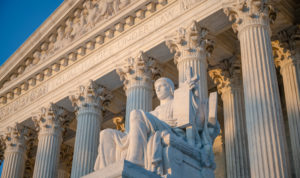
The U.S. House of Representatives impeaches President Trump, the Supreme Court reinstates a rule restricting access to abortion drugs, and more…
IN THE NEWS
- Following the storming of the U.S. Capitol by supporters of President Donald J. Trump, the U.S. House of Representatives voted to impeach President Trump for the second time, this time for “incitement of insurrection.” Opponents of impeachment were concerned that a Senate trial at the beginning of a Biden Administration will further divide the country. But in a statement delivered at the opening of the impeachment debate, House Speaker Nancy Pelosi (D-Calif.) argued that the President must be impeached because he is “a clear and present danger to the nation we all love.” Despite calls from Democrats for the Senate trial to begin immediately, Senate Majority Leader Mitch McConnell (R-Ky.) has stated that the trial will not begin until after the Senate reconvenes on January 19.
- The U.S. Supreme Court rejected a trial court order temporarily halting the application of a U.S. Food and Drug Administration (FDA) rule that requires patients to access the abortion pill mifepristone only by appearing in person at a certified health care provider. The lower court had halted the application of the FDA rule due to the coronavirus pandemic, effectively allowing patients to receive mifepristone via mail or pharmacy delivery services. Chief Justice John Roberts stated that that the Court was not deciding whether “the requirements for dispensing mifepristone impose an undue burden on a woman’s right to an abortion as a general matter.” Instead, the Chief Justice saw the question before the Court as one of judicial deference to an expert agency. Justice Sonia Sotomayor in dissent, however, noted that facility closures during the pandemic and the risk of contracting the coronavirus rendered FDA’s in-person requirement an “undue burden on a woman’s constitutional right to an abortion.”
- A federal judge blocked a U.S. Department of Homeland Security rule that would have further restricted migrants’ ability to obtain asylum in the United States. Concluding that the plaintiffs challenging the rule would likely be successful in demonstrating that acting Homeland Security Secretary Chad Wolf lacked authority to issue the rule, the judge issued a nationwide injunction barring the rule from taking effect. The judge lamented that “the government has recycled exactly the same legal and factual claims made in prior cases, as if they had not been soundly rejected in well-reasoned opinions by several courts.”
- The U.S. Environmental Protection Agency (EPA) finalized a rule that will exempt certain stationary sources of pollutants—such as factories, refineries, and boilers—from greenhouse gas emissions limits. EPA justified the rule, which applies to stationary sources in any industry whose greenhouse gases are no greater than 3 percent of total U.S. emissions, by asserting that such sources do not “contribute significantly to dangerous air pollution.” David Doniger of the environmental group Natural Resources Defense Council said the new rule “is perverting the Clean Air Act to ensure that no industry other than the power sector ever has to cut its climate pollution.”
- The Office of the Comptroller of the Currency finalized its “fair access” rule, which prohibits national banks from refusing to conduct business with entities in controversial industries such as fossil fuels and gun manufacturing for reasons other than financial risk. The regulation prevents banks with over $100 billion in assets from declining to offer credit, services, and capital to companies solely based on a bank’s concern for its reputation or effect on the environment. Senator Kevin Kramer (D-N.D.) praised the rule, stating that “fairness matters” and that “discrimination is not allowed in our society and big banks should not be an exception.” But several big banks oppose the rule, noting that they pledged to stop financially supporting oil and gas companies that are engaged in harmful environmental practices.
- A federal appellate court ruled that a supervised injection site—a facility where people can use illicit drugs under medical supervision with overdose reversal services and sterile equipment—violates federal drug law. The Controlled Substances Act makes it unlawful for anyone to maintain a property for the purpose of using controlled substances, which includes illegal drugs such as heroin. In a 2-1 ruling, the panel of appellate judges concluded that, despite the need for innovative solutions to combat opioid-related overdoses, efforts to curb overdoses cannot break the law. Supporters of the site, however, argue that the law was designed to target “crackhouses” during the cocaine epidemic and does not apply to public health measures intended to prevent overdoses rather than endorse illegal drug use. The site, which was set to open in Philadelphia—a city at the epicenter of the opioid epidemic—would have been the first supervised injection site in the United States.
- The U.S. Department of the Treasury proposed a rule to implement reporting requirements for banks and money service businesses completing certain virtual currency transactions, such as those exceeding $10,000. For covered transactions, banks and businesses would be required to report information, including the type of currency transacted, the amount and assessed value of the transaction, and the transaction “hash”—a unique identifier—to the Treasury Department’s Financial Crimes Enforcement Network. Critics of the proposed rule argue that the reporting requirements constitute “a form of warrantless search and seizure of private financial records.”
- Days before two COVID-19 positive inmates were scheduled to be put to death, a federal judge suspended their executions, expressing concern for the public interest that “executing inmates who are positive for COVID-19 in a facility with an active COVID-19 outbreak will endanger the lives of those performing the executions and those witnessing it.” If a higher court does not overrule the decision, the executions would occur no earlier than March 2021. The delay in punishment raises the possibility that neither inmate will be put to death, as calls to abolish capital punishment grow among Democrats, including President-Elect Joe Biden.
- A new rule from the U.S. Department of Labor will increase the wages that must be paid to highly skilled workers on H-1B visas. The Labor Department asserted that the new requirements will “protect the wages and job opportunities of U.S. workers,” but it also reported that an “overwhelming majority of commenters opposed the new wage level computation methodology.” Late last year, three courts struck down an interim version of the final rule on procedural grounds.
WHAT WE’RE READING THIS WEEK
- In a report issued by the Brookings Institution, Philip A. Wallach of the American Enterprise Institute argues that regulation in the 21st century has “become a far more partisan issue,” with presidential administrations often taking the opposite approach to the previous administration’s regulatory agenda. This pendulum effect, Wallach explains, is in part caused by legislative inability to establish enduring regulatory change. Legislative gridlock forces presidential administrations to rely instead on executive orders, guidance, and rules, none of which “can actually change the law on the books,” Wallach notes. Wallach urges policymakers to shift away from reliance on agency actions and instead focus on creating lasting regulatory change through legislation when possible.
- In an op-ed appearing in Politico, Andrew R. Moore, a foreign service officer for the U.S. Department of State, criticizes the United States’ binary approach to immigration. Moore explains that under the current system, migrants are categorized either as immigrants or nonimmigrants—or visitors who lack intent to live in the country permanently. According to Moore, this system encourages certain migrants, such as the parents and grandparents of U.S. citizens, to apply for immigrant visas rather than nonimmigrant visas, which creates a processing backlog. Moore advocates a hybrid approach that merges the immigrant and nonimmigrant visa for parents and grandparents.
- In an article in Health Affairs, Divya Manoharan and her coauthors advocate including undocumented immigrants in plans to distribute the COVID-19 vaccine. Manoharan explains that such a plan would accord with the Centers for Disease Control and Prevention’s recommendation to prioritize essential workers for vaccination since many undocumented immigrants in the United States are essential workers. To ensure vaccine uptake among undocumented immigrants, Manoharan recommends cost-free vaccinations and administration of the vaccine at community fairs, schools, and faith-based organizations.
FLASHBACK FRIDAY
- In a 2019 essay in The Regulatory Review, Jeff Kosseff, assistant professor of cybersecurity law at the U.S. Naval Academy, argued that immunity under Section 230 of the Communications Decency Act covers more than just “neutral” platforms. Under Section 230, online platforms enjoy significant insulation from lawsuits arising out of the third-party content they host. Contrary to common belief, courts have interpreted Section 230 broadly in ways that have “never hinged on a platform being ‘neutral,’” according to Kosseff.



